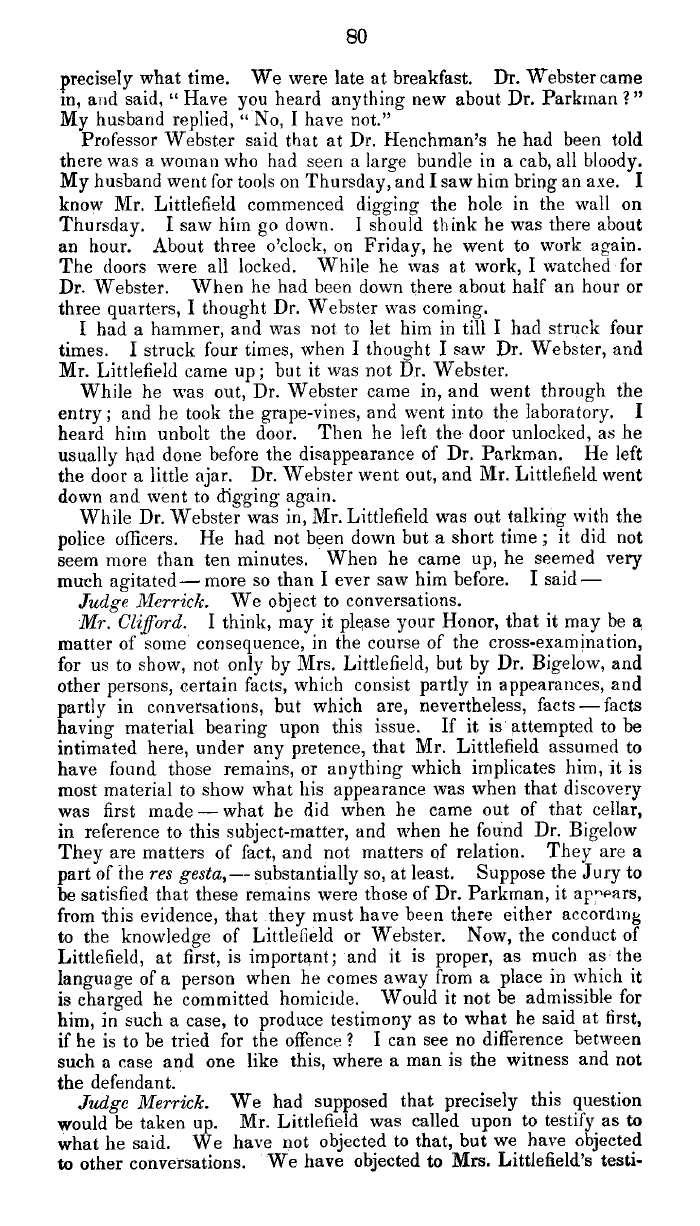|
80
precisely what time. We were late at breakfast. Dr. Webster came
in, and said, °° Have you heard anything new about Dr. Parkman ?"
My husband replied, °' No, I have not."
Professor Webster said that at Dr. Henchman's he had been told
there was a woman who had seen a large bundle in a cab, all bloody.
My husband went for tools on Thursday, and I saw him bring an axe. I
know Mr. Littlefield commenced digging the hole in the wall on
Thursday. I saw him go down. I should think he was there about
an hour. About three o'clock, on Friday, he went to work again.
The doors were all locked. While he was at work, I watched for
Dr. Webster. When he had been down there about half an hour or
three quarters, I thought Dr. Webster was coming.
I had a hammer, and was not to let him in till I had struck four
times. I struck four times, when I thought I saw Dr. Webster, and
Mr. Littlefield came up; but it was not Dr. Webster.
While he was out, Dr. Webster came in, and went through the
entry; and he took the grape-vines, and went into the laboratory. I
heard him unbolt the door. Then he left the door unlocked, as he
usually had done before the disappearance of Dr. Parkman. He left
the door a little ajar. Dr. Webster went out, and Mr. Littlefield went
down and went to digging again.
While Dr. Webster was in, Mr. Littlefield was out talking with the
police officers. He had not been down but a short time ; it did not
seem more than ten minutes. When be came up, he seemed very
much agitated-more so than I ever saw him before. I said-
Judge Merrick. We object to conversations.
Mr. Clifford. I think, may it please your Honor, that it may be a
matter of some consequence, in the course of the cross-examination,
for us to show, not. only by Mrs. Littlefield, but by Dr. Bigelow, and
other persons, certain facts, which consist partly in appearances, and
partly in conversations, but which are, nevertheless, facts-facts
having material bearing upon this issue. If it is attempted to be
intimated here, under any pretence, that Mr. Littlefield assumed to
have found those remains, or anything which implicates him, it is
most material to show what his appearance was when that discovery
was first made -what he did when he came out of that cellar,
in reference to this subject-matter, and when he found Dr. Bigelow
They are matters of fact, and not matters of relation. They are a
part of the res gesta,--substantially so, at least. Suppose the Jury to
be satisfied that these remains were those of Dr. Parkman, it aF^Pars,
from this evidence, that they must have been there either according
to the knowledge of Littlefield or Webster. Now, the conduct of
Littlefield, at first, is important; and it is proper, as much as the
language of a person when he comes away from a place in which it
is charged he committed homicide. Would it not be admissible for
him, in such a case, to produce testimony as to what he said at first,
if he is to be tried for the offence ? I can see no difference between
such a case and one like this, where a man is the witness and not
the defendant.
Judge Merrick. We had supposed that precisely this question
would be taken up. Mr. Littlefield was called upon to testify as to
what he said. We have not objected to that, but we have objected
to other conversations. We have objected to Mrs. Littlefield's testi-
|

